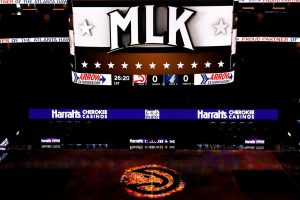More than 50 years after the Civil Rights movement, Black Americans still face discrimination in banking. But pro sports teams can help change that.

- The lack of access to basic financial services in poor and Black neighborhoods has forced underserved populations to rely on costly alternatives like check-cashing, money orders, and payday loans.
- In minority-majority zip codes, Black banks are often the primary source for fair, non-predatory lending. But since 2001, their numbers have fallen by more than 50%.
- In December, the Atlanta Hawks announced a historic $35 million transaction with 11 Black banks, which will allow them to extend new lines of credit to would-be Black homebuyers and entrepreneurs.
- Ryan Clark is an ESPN analyst, Super Bowl XLII champion, and board member of the National Black Bank Foundation.
- Ashley Bell is a partner at the global law firm Dentons and serves as counsel for the National Black Bank Foundation.
- This is an opinion column. The thoughts expressed are those of the authors.
- Visit Business Insider's homepage for more stories.
Fifty years after the Fair Housing Act banned the systematic denial of credit to borrowers based on race or where they lived, lenders still rejected mortgages for Black applicants at a rate 80% higher than white borrowers in 2020.
By law, banks can no longer reject a borrower on the basis of race. But the second-order consequences of historical systems of discrimination—like the hollowing out of major commercial money centers and non-predatory financial services from neighborhoods of color—continue to deprive Americans of color equitable access to capital.
Communities saturated with corner stores and fast food restaurants but lacking grocery markets create obvious challenges in maintaining a healthy diet. Similarly, neighborhoods with costly check-cashing and payday loan operations on every block but few to no banks make it difficult to build wealth.
Unfortunately, that's the reality for many people of color. Breaking that cycle of financial exclusion requires building up the banks that have locations near and serve people of color. For most Black Americans, those are Black-owned banks.
As it has done for decades, professional sports is showing the way. This month, the NBA's Atlanta Hawks announced a historic $35 million transaction with a syndicate of Black-owned banks. The first-in-professional sports deal materially strengthened the banks' ledgers and positioned them to extend new credit to would-be Black entrepreneurs and first-time homebuyers.
Now, imagine what would happen if a whole league or an entire city's professional sports ecosystem banked Black. The potential for growth would be unlimited.
In 1976, there were 50 Black banks across the country. By the FDIC's latest count, and thanks to a systemic devaluing of Black property, that number stands at just 18. Their retrenchment, coupled with mainstream banks' absence, has created tremendous disparities between the banked and unbanked populations, and to the country's wealth gap in general.
According to a 2019 study by McKinsey & Co, majority-white counties have 41 financial institutions for every 100,000 people, compared to 27 banks in neighborhoods of color. That disparity helps explain why so many Black households remain unbanked or underbanked. While only 15% of white households were unbanked or underbanked last year, almost half of Black families were, according to the Federal Reserve.
That lack of access to basic financial services has forced Black households to rely on costly alternatives like check-cashing services, money orders, payday loans, and prepaid credit cards. By one estimate, those fees can total upwards of $40,000 over a financial lifetime. At that price, the cost of living underbanked in America is more than double the average net worth of Black families.
Putting Black banks on a glide path to greater capitalization sets Black families on track to generating wealth—real wealth, the sort that white families pass down at an amount almost 200 times greater on average than Blacks. That's the sort of transformative solution families need to escape the continuum of poverty.
Pro sports can help end the system of Jim Crow credit that has ruthlessly excluded people of color from financial services by banking Black. The Hawks proved—to other teams, leagues, and the whole of corporate America—that it's possible to do good in the community and do good business simultaneously.
Ryan Clark is an ESPN analyst, Super Bowl XLII champion, and board member of the National Black Bank Foundation, which organized the Hawks transaction
Ashley Bell is a partner at the global law firm Dentons and serves as counsel for the National Black Bank Foundation and the Black bank syndicate.
Source: Read Full Article
